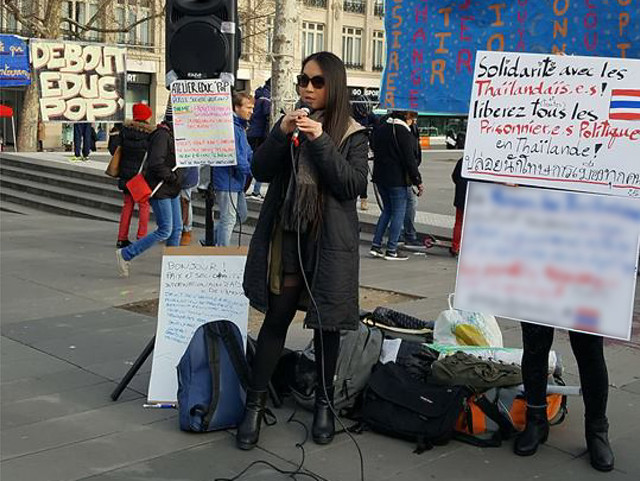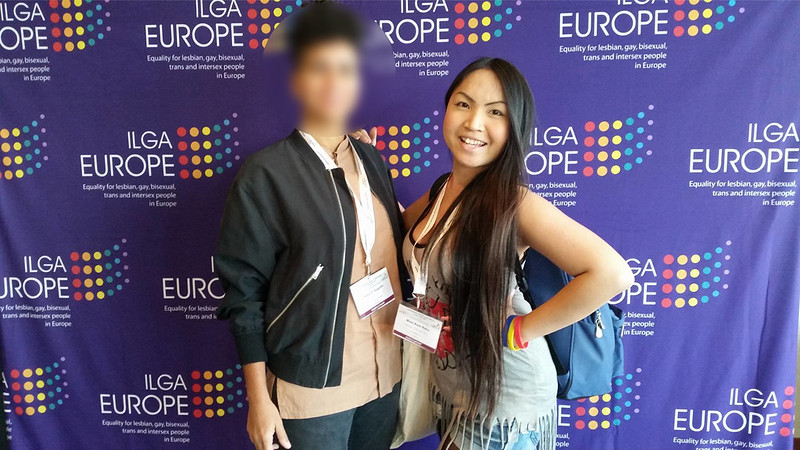7th of March, the day before International Women’s Day, was an important day for Aum Neko. It was the day, after four years of living as a political refugee in Paris, that her gender transition was legally recognised: the day she legally became Madame Saran Chuichai. But for Aum, legal recognition is irrelevant to her experience of womanhood. In her eyes, she has been a woman all her life and believes passionately in "self-determination" when it comes to gender identity. Aum is a transgender Thai woman. Unlike in Thailand, where trans people cannot change their gender, gender recognition laws were introduced in France in 2016.
After escalating acts of defiance of the Thai government, Aum fled Thailand in 2014 after being summoned by the junta's National Council for Peace and Order. She knew that if she did not escape, she would be imprisoned on lése majesté charges, in a male prison, where, as a transgender woman, she would be in danger of rape and violence.
But you have probably already heard of Aum Neko. Her radical activism, which began in 2012 when she posed provocatively on a statue of Pridi Banomyong at Thammasat, has attracted a disproportionate amount of attention. Her style is undoubtedly inflammatory, something anyone who remembers her incredibly bold 2013 campaign against uniforms at Thammasat University can attest to (sample slogan: "Don’t student uniforms make having sex more fun?"). She left Chulalongkorn University after being forced to wear a male uniform by a faculty that was totally unaccepting of her gender identity. She was forced to leave Thammasat too, when she attempted to raise a black flag to replace the Thai national flag at the university's dome building, in a protest against Rector Somkid Lerdpaitoon’s supposed support for the anti-democracy movement.

Aum Neko was behind the posters advocating the abolition of university uniforms by portraying students in uniform simulating various sexual acts. The university ordered the posters to be taken down a day after they were placed around the campus
Even so, Aum has always been a source of fascination to the Thai public and media. I ask her why she thinks this is, and she tells me "men don’t expect transgender women to be present in politics. It’s not what society asks of transgender women". And what is? "You have to be a ‘good’ transgender. You have to be beautiful, or to be hilarious and ridiculous". Aum admits "before I was involved in activism, I really conformed to these ideas. I acted really feminine and believed if I were cute enough, guys would like me". Aum is totally cis passing and an attractive woman (cisgender; someone whose gender identity matches the sex they had at birth). As such, she has escaped a lot of the discrimination which her less conventionally good-looking transgender friends face. "Those who did not conform to cis norms faced violence and bullying. I am luckier than them. But I will not forget them or take advantage of the treatment I receive [...] transgender women shouldn’t have to have perfect makeup to be accepted into society".
Besides, being totally cis-passing (especially outside of Thailand) has not always been an advantage to Aum. She tells me about her past dating experiences in Paris. She has been met with horrified reactions when she has revealed to men she has been dating that she is transgender. She said some men were "disgusted" when found out about her sexuality and accused her of lying and manipulation. She explains that men are distressed by the fact she is not clearly transgender. "They cannot believe that they would want to date a transgender woman”.
She believes men react so strongly because she is a threat to their "fragile" masculinity and heterosexuality. Aum believes the reason men so often become angry when they realise a woman they have been sexually attracted to is a transgender woman is that "they want to distance themselves, to protect themselves, from something inside themselves which is attracted to a transgender woman".
Aum Neko (far left) joins an anti-junta protest in Paris.
And when they don’t respond with violence, Aum tells me, they try to make her into a joke. "To try to prove their masculinity to themselves, they make jokes about transgenders and me. They want to show they are real men. That they are biologically male, that they hang out with only men, that they are part of the male culture". Surprisingly, many of the most insulting transphobic remarks she has received have been from members of the activist community. Activism in Thailand is "not that progressive", she tells me. "Most of the activists in Thailand are men, and discourse comes from the mouths of men".
Fortunately, Aum’s current Westerner boyfriend of two years was much more accepting when she explained her past to him. When she told him she was transgender he was "a bit surprised", but ultimately decided his feelings for her were much more important than her being transgender. They don’t agree on everything though. “He doesn’t agree with my politics,” Aum tells me. He is not as radically left-wing as her, and "can’t stand it when I talk about communism," she tells me with a laugh. She has become much more educated on political theory since she arrived in Paris, where she studies sociology at Université Paris Diderot.
This is one of the more personal intimate moments of our interview, as Aum generally answers my personal questions with general, philosophical answers. This may be a form of self-protection. She has been viciously attacked by the right-wing Thai media. In 2014 the ultra-nationalist newspaper ASTV published a disturbing piece describing how Aum would be gang-raped in prison by male inmates if she was arrested. After King Bhumibol’s death, in an atmosphere of increasing hostility to any form of subversion, even the United Nation High Commission for Refugees (UNHCR) condemned her, reiterating that they had nothing to do with her being granted political asylum in France. Aum did nothing to diminish the violent backlash against her, broadcasting radical comments about the late King through Facebook live. In response, the vigilante ultra-royalist doctor Maj Gen Rienthong Nanna published on his Facebook page the Parisian address where he believed Aum was being sheltered. He menacingly urged Thais living in France to go to the address and tell him whether she was there.

Aum Neko joins a pro-democracy protest in Paris
During our interview, I find it hard to reconcile Aum’s audacious and provocative public image with the agreeable, softly-spoken women I chat to. Again, I think this is Aum protecting herself, by creating an activist persona that reveals none of her vulnerability or the struggle she faces. She is determinedly upbeat. I ask her how she felt during the four-month period in 2014 when she was left in limbo, unsure whether she was going to be granted asylum in France or have to return to Thailand to go to prison. She tells understatedly tells me it was "quite stressful", but that it "made her feel stronger".
Besides dealing with threats of violence and humiliation as a transgender woman, she is faced with sexual harassment. Aum said she has had men press themselves against her on public transport, and whisper sexually aggressive things in her ears in public. The harassment she receives in France is much more intense than in Thailand, which she connects to the massive fetishisation of Asian woman by western men. She believes we need to "fight back against the sexualised clichés about Asian women: that we want to have sex all the time, that we are innocent, submissive".
Even though kathoei are deceptively transgressive, Aum argues they face massive pressure to conform to the dominant values of Thai society. "If transgender women who were participants in the yellow-shirt protests follow mainstream values of Nation, Monarchy and Religions, they will gain acceptance and projection". Aum believes the transgender people who gain the most respect in Thailand are the ones who are most compliant, "the ones who say in interviews LGBT people need to have respect [for the status quo], that they shouldn’t do anything too radical".
I ask her about the "ladyboy" label and her experiences with it In France. She confirms that Westerners try to assign her the role of "ladyboy", without realising how reductive that category is. "They think it is normal, but it’s a term that Western people have assigned us. Most ladyboys think of themselves as women". Aum describes the word as "demeaning". The ladyboy label takes away her autonomy: people have previously assumed this is how she identifies without asking her. She talks about how Westerners find Thai ladyboys "funny"; this mockery is stigmatising.
Aum believes that part of the problem is that many Thai transgender women accept this mocking treatment, in Thailand and the West, just to get by. Aum believes passionately that this is not the path to emancipation. If the Thai transgender community continues to "submit to the people who dominate and oppress us", they will continue to "be discriminated against from birth to death … we die without dignity, without honour. We cannot keep on waiting for the day the oppressors just give us our rights". Even LGBT people with traditional or conservative political views "must stop supporting the military and the monarchy and start supporting the fight for democracy".
Due to her fluency in many languages, Aum represents a Paris-based LGBT organisation in a conference
Aum has always been a vocal supporter of the fight for democracy in Thailand, and she discusses how the battle for democracy is intimately linked to the fight for LGBT and gender rights. "Democracy is about more than elections, politicians and coups d’état," she tells me. “It's about representing the experience of people who have always been oppressed by society and our social structure". She is living proof that the personal is political. Her engagement in activism has totally transformed her life. A few years ago, she was an ordinary student. Now, she is a political exile with little hope of returning to her home country until the lèse majesté law changes, something which may not happen for generations. When I ask her if she has ever considered abandoning her activism and living a normal life, she tells me "I would not necessarily talk about democracy, but I have to show that it’s a part of myself, a part of my life, and it can change my life and the lives of so many people who suffer".





